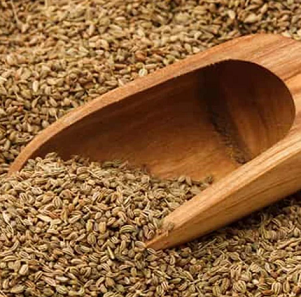
Carom seeds
Carom seeds, also known as ajwain or bishop’s weed, are small, oval, ridged seeds derived from the Ajwain plant (Trachyspermum ammi) that belongs to the Apiaceae family. These seeds have a pungent, aromatic flavor and are commonly used as a spice in Indian cuisine, particularly in various regional dishes.
Key aspects of carom seeds include:
-
Culinary Use: Carom seeds are used as a spice and have a strong, distinct flavor with notes of thyme and oregano. They are often employed in Indian cooking, especially in lentil dishes, bread (such as parathas or puris), snacks, pickles, and vegetable dishes.
-
Digestive Properties: In traditional medicine and Ayurveda, carom seeds are renowned for their digestive properties. They are believed to aid digestion, reduce flatulence, and alleviate stomach discomfort. Some people chew a few seeds after meals for digestive relief.
-
Aroma and Taste: Carom seeds have a strong, slightly bitter and peppery taste. When roasted or fried in oil, their aroma becomes more pronounced and fragrant.
-
Health Benefits: Beyond aiding digestion, carom seeds are believed to have other potential health benefits, such as relieving respiratory problems, coughs, and asthma symptoms.
Carom seeds are available in many grocery stores, particularly those specializing in Indian or Middle Eastern ingredients. They’re an essential spice in Indian cooking, adding a distinct flavor and contributing to the overall taste of various dishes while offering potential health and digestive benefits.
